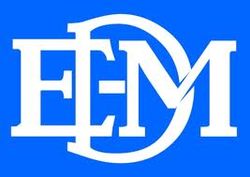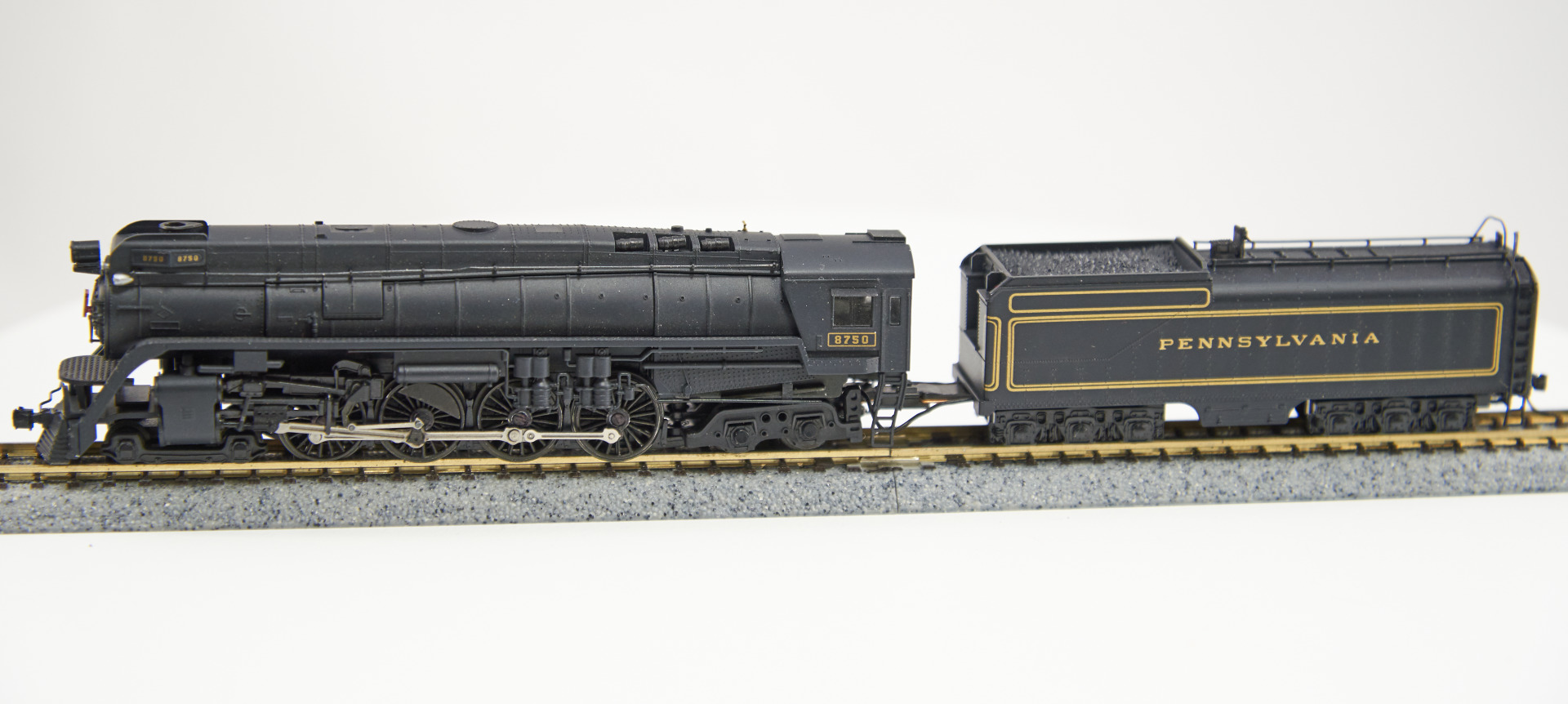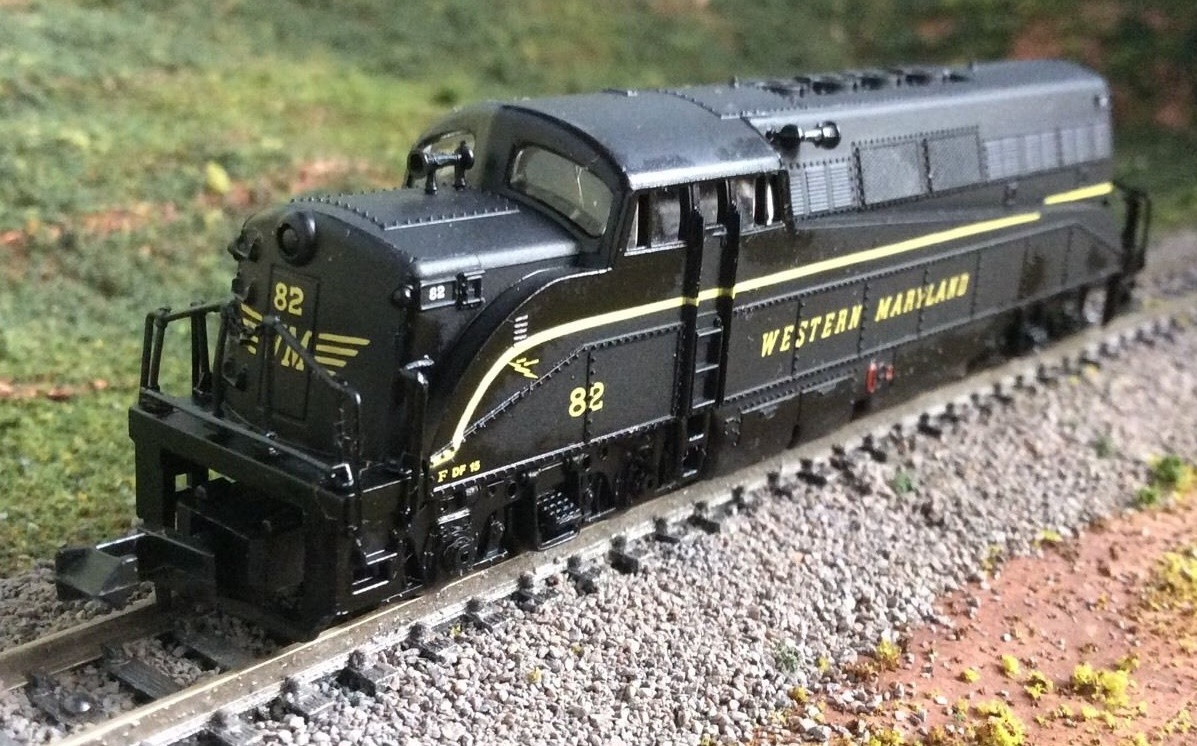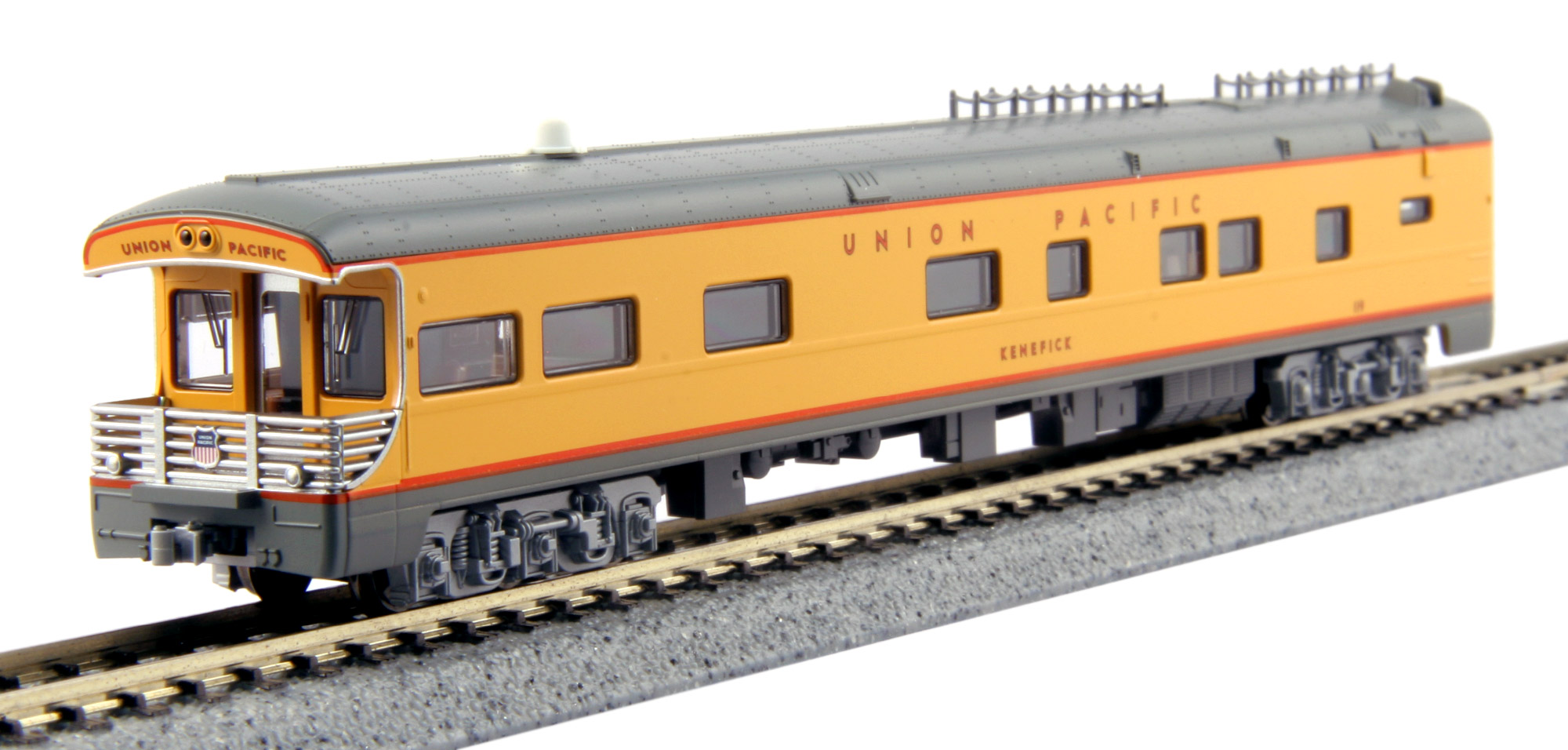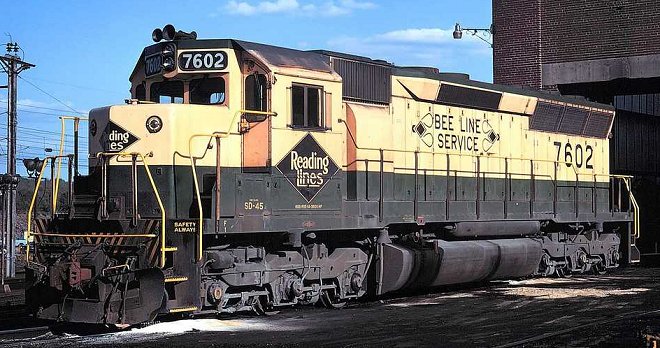Model Information: Mehano of Yugoslavia produced this engine for Atlas starting in 1969. The list price when it came out was $16.98. The plastic shell is a reasonable facsimile of the prototype. The mechanism is a typical late 60's Mehano product, with the motor mounted in the middle of the frame. The motor drives a a worm gear in the rear truck. All four of the rear truck drive wheels have traction tires.
Atlas did not produce a lot of these things and all road names became unavailable by 1972. After Atlas ceased production of this tooling, Model-Power and Life-Like produced this model for a short period, followed by Con-Cor in 1972; the Con-Cor model uses the same shell but is fitted with a different mechanism (hence a different body style in this database).
Atlas did not produce a lot of these things and all road names became unavailable by 1972. After Atlas ceased production of this tooling, Model-Power and Life-Like produced this model for a short period, followed by Con-Cor in 1972; the Con-Cor model uses the same shell but is fitted with a different mechanism (hence a different body style in this database).
DCC Information: This model is not DCC capable.
Prototype History: Notable as the first locomotive with an engine larger than 16 cylinders upon its introduction in 1965, the EMD SD45 was used on nearly every railroad at one time or another. Over the course of six years, EMD built a whopping 1260 SD45 locomotives for freight use on more than 25 railroads, with many more acquiring them second-hand. The SD45, while sharing the same common frame as the EMD SD40, was distinguished by a number of characteristics such as the flared radiator that stretched across the side of the locomotive's long hood. Several SD45 locomotives are still preserved and in service today.
From Wikipedia
Read more on American-Rails.com
From Wikipedia
Read more on American-Rails.com
Road Name History: Electro-Motive Diesel (EMD) is an American manufacturer of diesel-electric locomotives, locomotive products and diesel engines for the rail industry. The company is owned by Caterpillar through its subsidiary Progress Rail Services Corporation.
Electro-Motive Diesel traces its roots to the Electro-Motive Engineering Corporation, a designer and marketer of gasoline-electric self-propelled rail cars founded in 1922 and later renamed Electro-Motive Company (EMC). In 1930, General Motors purchased Electro-Motive Company and the Winton Engine Co., combining the two to form its Electro-Motive Division (EMD) in 1941.
In 2005, GM sold EMD to Greenbriar Equity Group and Berkshire Partners, which formed Electro-Motive Diesel to facilitate the purchase. In 2010, Progress Rail Services completed the purchase of Electro-Motive Diesel from Greenbriar, Berkshire, and others.
EMD's headquarters, engineering facilities and parts manufacturing operations are based in McCook, Illinois, while its final locomotive assembly line is located in Muncie, Indiana. EMD also operates a traction motor maintenance, rebuild and overhaul facility in San Luis Potosí, Mexico.
As of 2008, EMD employed approximately 3,260 people, and in 2010 it held approximately 30 percent of the market for diesel-electric locomotives in North America.
From Wikipedia
Electro-Motive Diesel traces its roots to the Electro-Motive Engineering Corporation, a designer and marketer of gasoline-electric self-propelled rail cars founded in 1922 and later renamed Electro-Motive Company (EMC). In 1930, General Motors purchased Electro-Motive Company and the Winton Engine Co., combining the two to form its Electro-Motive Division (EMD) in 1941.
In 2005, GM sold EMD to Greenbriar Equity Group and Berkshire Partners, which formed Electro-Motive Diesel to facilitate the purchase. In 2010, Progress Rail Services completed the purchase of Electro-Motive Diesel from Greenbriar, Berkshire, and others.
EMD's headquarters, engineering facilities and parts manufacturing operations are based in McCook, Illinois, while its final locomotive assembly line is located in Muncie, Indiana. EMD also operates a traction motor maintenance, rebuild and overhaul facility in San Luis Potosí, Mexico.
As of 2008, EMD employed approximately 3,260 people, and in 2010 it held approximately 30 percent of the market for diesel-electric locomotives in North America.
From Wikipedia
Brand/Importer Information: In 1924 Stephan Schaffan, Sr. founded the Atlas Tool Company in Newark, New Jersey. In 1933 his son, Stephan Schaffan, Jr., came to work for his father at the age of sixteen. Steve Jr. built model airplanes as a hobby and frequented a local hobby shop. Being an enterprising young man, he would often ask the owner if there was anything he could do to earn some extra spending money. Tired of listening to his requests, the hobby-store owner threw some model railroad track parts his way and said, "Here, see if you can improve on this".
In those days, railroad modelers had to assemble and build everything from scratch. Steve Jr. created a "switch kit" which sold so well, that the entire family worked on them in the basement at night, while doing business as usual in the machine shop during the day.
Subsequently, Steve Jr. engineered the stapling of rail to fiber track, along with inventing the first practical rail joiner and pre-assembled turnouts and flexible track. All of these products, and more, helped to popularize model railroading and assisted in the creation of a mass-market hobby. The budding entrepreneur quickly outgrew the limitations of a basement and small garage operation. Realizing they could actually make a living selling track and related products, Steve and his father had the first factory built in Hillside, New Jersey at 413 Florence Avenue in 1947. On September 30, 1949, the Atlas Tool Company was officially incorporated as a New Jersey company.
In 1985, Steve was honored posthumously for his inventions by the Model Railroad Industry Association and was inducted into the Model Railroad Industry Hall of Fame in Baltimore, Maryland. In addition, Steve was nominated and entered into the National Model Railroad Association Pioneers of Model Railroading in 1995.
In the early 1990s, the Atlas Tool Company changed its name to Atlas Model Railroad Company, Inc.
In those days, railroad modelers had to assemble and build everything from scratch. Steve Jr. created a "switch kit" which sold so well, that the entire family worked on them in the basement at night, while doing business as usual in the machine shop during the day.
Subsequently, Steve Jr. engineered the stapling of rail to fiber track, along with inventing the first practical rail joiner and pre-assembled turnouts and flexible track. All of these products, and more, helped to popularize model railroading and assisted in the creation of a mass-market hobby. The budding entrepreneur quickly outgrew the limitations of a basement and small garage operation. Realizing they could actually make a living selling track and related products, Steve and his father had the first factory built in Hillside, New Jersey at 413 Florence Avenue in 1947. On September 30, 1949, the Atlas Tool Company was officially incorporated as a New Jersey company.
In 1985, Steve was honored posthumously for his inventions by the Model Railroad Industry Association and was inducted into the Model Railroad Industry Hall of Fame in Baltimore, Maryland. In addition, Steve was nominated and entered into the National Model Railroad Association Pioneers of Model Railroading in 1995.
In the early 1990s, the Atlas Tool Company changed its name to Atlas Model Railroad Company, Inc.
Manufacturer Information: Mehano is a Slovenian toy manufacturer located in Izola, Slovenija. The company was founded as Mehanotehnika and was producing toys starting in June 1953. They first exhibited at the Nuerenberg Toy Fair in 1959. Mehano produced a number of different locomotives and rolling stock models for the North American market in the 1960s and 1970s. Companies such as Atlas and Life-Like imported a huge variety of their products. Generally they can easily be recognized as they are stamped "Yugosolavia" on the underframe. The company was formally renamed "Mehano" in 1990. Izola today is part of the country of Slovenia since the breakup of Yugoslavia.
Mehano filed for bankruptcy in 2008, but still continued to exist and operate. Since 2012, Mehano products are distributed by Lemke.
Mehano filed for bankruptcy in 2008, but still continued to exist and operate. Since 2012, Mehano products are distributed by Lemke.
Item created by: gdm on 2016-08-17 16:12:14. Last edited by gdm on 2018-02-15 20:39:09
If you see errors or missing data in this entry, please feel free to log in and edit it. Anyone with a Gmail account can log in instantly.
If you see errors or missing data in this entry, please feel free to log in and edit it. Anyone with a Gmail account can log in instantly.





